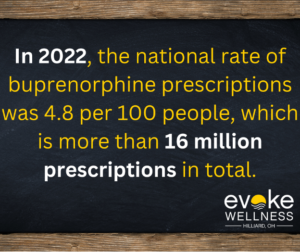You may be considering stopping suboxone. As you prepare for this major life change, it’s important to understand what to expect during withdrawal and how to cope. This article provides information to guide you through the process. We cover topics like:
- Common Suboxone Withdrawal Symptoms
- Timeline for Withdrawal
- Managing Discomfort and Cravings
- Seeking Medical and Emotional Support
- Developing Healthy Routines
Whether you’re dependent on suboxone, hydrocodone, or other opioids, withdrawal can be challenging. But with preparation and support, you can get through it successfully. Use this article as your resource for facing suboxone withdrawal with confidence. Call us at (833) 949-1347 today or reach out online.
Understanding Suboxone Withdrawal
Physical Dependency Risks
Suboxone, a combination of buprenorphine and naloxone, is commonly prescribed as a medication-assisted treatment for opioid addiction. While it helps reduce cravings and prevents withdrawal from opioids like heroin or prescription painkillers, prolonged Suboxone use can also lead to physical dependence.
Withdrawal Symptoms
When you discontinue Suboxone after extended use, uncomfortable withdrawal effects may arise. Common symptoms include drug cravings, anxiety, insomnia, muscle aches, runny nose, abdominal pain, diarrhea, and others. These typically start within 12-24 hours after the last dose.
Managing Withdrawal Safely
While less severe than full opioid withdrawal, Suboxone withdrawal can still be distressing. Medically supervised detox programs provide a safe, controlled environment to taper off Suboxone gradually. This approach helps minimize withdrawal risks and discomfort under professional care.
- Counseling support and medication management ease the transition
- Inpatient or outpatient options fit individual needs
- Holistic therapies promote lasting recovery
With comprehensive treatment like that offered at Evoke Wellness Hilliard, OH, you can break free from Suboxone dependence while addressing underlying opioid addiction. The path begins with understanding withdrawal – the first step to regaining control.
Symptoms of Suboxone Withdrawal
When dependent on Suboxone, a medication containing buprenorphine and naloxone used to treat opioid addiction, stopping its use can trigger withdrawal symptoms as your body adjusts. These symptoms typically start within 12-24 hours after the last dose and peak around 3-4 days.
Early Withdrawal Signs
- Intense drug cravings
- Anxiety and irritability
- Insomnia and restlessness
- Runny nose or sneezing
Peak Withdrawal Phase
- Severe muscle aches and pains
- Abdominal cramps, nausea, vomiting
- Diarrhea and digestive issues
- Chills, goosebumps, sweating
Lingering Effects
While most physical symptoms subside within 7-10 days, some psychological effects like depression, fatigue, and drug cravings can persist for up to 30 days. The severity depends on your dosage and length of Suboxone treatment.
Tapering Suboxone doses gradually under medical supervision at a facility like Evoke Wellness Hilliard, OH can help reduce withdrawal intensity and duration compared to abrupt cessation. Their comprehensive treatment also offers counseling and support to overcome opioid addiction and prevent relapse.
Suboxone Withdrawal Timeline
Acute Withdrawal Phase
- Typically lasts 4-10 days after last dose
- Symptoms peak around 72 hours and include muscle aches, insomnia, nausea
- Cravings for opioids are intense during this stage
Early Withdrawal
- Lasts 2-4 weeks after acute phase ends
- Less severe physical symptoms like chills, stomach cramps
- Strong psychological cravings and mood swings persist
Buprenorphine in Suboxone helps manage withdrawal by preventing euphoric effects. This medication-assisted treatment allows a gradual taper off of opioids like painkillers or heroin under medical supervision.
Protracted Withdrawal
- Can last weeks to months after quitting Suboxone
- Symptoms are largely psychological: anxiety, depression, insomnia
- Triggers and cravings pose high relapse risks during this phase
Through comprehensive addiction treatment programs, you get support throughout the withdrawal process. Counseling, group therapy and lifestyle changes aid long-term recovery.
How Long Does Suboxone Withdrawal Last?

Withdrawal Duration Depends
The duration and severity of suboxone withdrawal symptoms can vary significantly between individuals. Several factors influence how long withdrawal may last, including the dosage taken, length of time on suboxone, metabolism rate, and whether a taper schedule was followed.
Typical Withdrawal Timeline
For most people, acute suboxone withdrawal begins within 24-72 hours after the last dose and peaks around 3 days. Symptoms then start subsiding but can persist for 5-7 days on average. According to experts, common withdrawal effects include:
- Drug cravings
- Anxiety and insomnia
- Sweating and chills
- Nausea and diarrhea
- Muscle aches and pains
Reducing Withdrawal Severity
To minimize the intensity of withdrawal, it’s crucial to taper the suboxone dosage slowly under medical supervision. This gradual reduction allows the body to adjust, making symptoms more manageable. Entering a specialized detox program provides a safe, supportive environment to get through this challenging phase.
Even after the acute physical withdrawal subsides, counseling and other therapeutic support are vital. This helps prevent relapse by addressing the psychological aspects of opioid addiction recovery.
Coping With Suboxone Withdrawal
Prepare for the Process
- Suboxone withdrawal can be challenging, but preparation is key. Consult with your doctor at Evoke Wellness Hilliard, OH about a tapering schedule to gradually reduce your dosage.
- Stock up on over-the-counter medications like ibuprofen or acetaminophen to manage muscle aches and headaches.
Seek Support
- Withdrawal can be emotionally draining. Lean on your support system of family, friends, or a counselor during this time.
- Consider joining a support group to connect with others going through similar experiences.
Practice Self-Care
- Stay hydrated and nourished by eating balanced meals and drinking plenty of fluids.
- Engage in relaxing activities like yoga, meditation, or light exercise to relieve stress and improve sleep quality.
- Be patient and kind to yourself throughout the process.
Suboxone Withdrawal FAQs
What are common withdrawal symptoms?
As the body adjusts to no longer having Suboxone, common withdrawal symptoms include drug cravings, anxiety, insomnia, sweating, muscle aches, stomach cramps, diarrhea, and chills. These can start within 12-24 hours after the last dose.
When do withdrawal effects peak?
Suboxone withdrawal symptoms typically peak around 3-4 days after the last dose but may continue for up to 1-2 weeks. Some psychological effects like cravings and anxiety can persist longer.
How to cope with withdrawal?
- Taper the dose slowly under medical supervision to minimize withdrawal severity when stopping treatment. Abruptly quitting can worsen symptoms.
- Stay hydrated and use over-the-counter medications for pain/discomfort relief as approved by your doctor.
- Support groups, counseling, and supplements like melatonin can help manage prolonged withdrawal effects.
When to seek medical help?
Contact your treatment provider immediately if you experience severe symptoms like hallucinations, uncontrolled vomiting/diarrhea, or suicidal thoughts during withdrawal. Medically-supervised detox may be necessary in these cases.
Conclusion
As you journey through suboxone withdrawal, remember that you have the inner strength to push through the difficult symptoms and emotions. With the right support system, coping strategies, and treatment program, you can overcome this challenge. Focus on self-care – stay hydrated, get good rest, eat nutritious foods. Lean on loved ones for encouragement. Consider inpatient or outpatient programs through trusted providers like Evoke Wellness Hilliard, OH. Their comprehensive services address underlying issues and build healthy new habits. You have so much potential ahead. Believe in yourself, take it one day at a time, and remain committed to your recovery. With each step forward, you move closer to the freedom of overcoming addiction. You’ve got this!
Begin Your Journey with Evoke Wellness at Hilliard
If you or a loved one is considering treatment, Evoke Wellness at Hilliard invites you to contact us. Our compassionate team is ready to answer your questions, discuss your needs, and help you take the first steps toward recovery. In Hilliard, you’ll find more than just a treatment program – you’ll discover a community dedicated to your wellness and success. Together, let’s embrace the journey to recovery and the promise of a new beginning. Call us at (833) 949-1347 today or reach out online.



